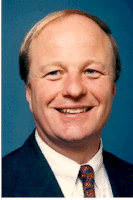
Supporters of Internet Filtering in Schools and Libraries Back
Franks-McCain Bill
(March 3, 1999) Supporters of the Children's Internet Protection Act held a press conference on Capitol Hill on Tuesday afternoon, March 2. Leaders of several groups, and Rep. Bob Franks, stated the case for requiring schools and libraries which receive e-rate subsidies to use filtering software to protect children from Internet pornography and child predators.
| See, Summary of the Children's Internet Protection Act. |
Rep. Bob Franks (R-NJ) and Sen. John McCain (R-AZ) are sponsoring similar bills, both of which are called the Children's Internet Protection Act. These bills would require that schools receiving e-rate subsidies use filtering software to protect child from Internet pornography.
Rep. Franks also introduced on March 2 his latest version of the filtering bill. HR 896 IH changes the requirements for libraries. The previous version, HR 543 IH, as well as the McCain version, S 97 IS, merely require that libraries install and use filtering software on one computer. However, under HR 896 IH, libraries would be required to install and use filtering software on all computers used by children.
The bulk of the press conference was devoted to presenting evidence and arguments that mandating filtering is good policy.
 |
|
| Rep. Franks |
Rep. Franks explained his view of the problem. "Within seconds, our children can find up-to-date information on every conceivable topic they are studying in school. But this extraordinarily powerful learning tool can also have a dark and threatening side. Pedophiles and other criminals are using the Internet to contact our children in those places where we want to believe they are most secure -- in our homes, our schools and our libraries. The reality is that materials breeding hate, violence, pornography and even personal danger can be waiting only a few "clicks" away."
Rep. Franks stated that, "The Children's Internet Protection Act would require schools and libraries to use filtering technology if they accept federal subsidies to connect to the Internet. Filtering technology -- which many parents have already installed on their home computers -- would keep materials designed only for adults out of the reach of our children."
Other participants at the event included:
Beth Spader came to testify about an incident involving her son at her local public library. Her eleven year old was surfing the Internet looking for information on another topic when a image came up which "was a depiction of a graphic sexual image." She continued that "my son was unnerved" and "my son's mind was molested by cyberpornography in the Library." Despite her protests, her library continued "offering unfettered Internet access to all patrons regardless of age." She now supports Rep. Franks' efforts to pass legislation.
David Burt, a public librarian from Oregon, and the founder of Filtering Facts, reported on a study of 613 libraries which he conducted. He stated that "the truth that we discovered was that the problem of children and adults accessing pornography in public libraries is far worse than organizations such as the American Library Association have led Americans to believe." He authored a report entitled "Dangerous Access," which "documented 503 incidents of patrons accessing pornography in public libraries. Children were involved in 245 of the incidents, and 20 involved child pornography."
"Another highly disturbing type of incident was of adults accessing pornography in full view of children in libraries," said Burt. "We need to have filters on every Internet terminal accessible to children in every public library."
Marie-Josie Ragab, of the Dulles, Virginia, Chapter of the National Organization of Women, also spoke in favor of the bill. However, unlike the other speakers, her argument did not focus on protecting children. Rather, "sexual harassment" is her concern. "Pornography on the Internet does constitute a sexually hostile environment." She says that it violates "our rights under Title VII."
Ragab, who wore an "I believe Juanita" button on her lapel, described the Dulles NOW Chapter as "the breakaway chapter of the National Organization of Women." She added that Patricia Ireland and the leadership of NOW is a "disgrace to American feminism."
Jan LaRue, of the Family Research Council, stated that "This irresponsible open access to hard-core pornography in public libraries is promoted by the ACLU and the American Library Association. These two agencies, working in lockstep, are aggressively litigating against public library policies that call for technological blocks on illegal obscenity, child pornography and other material "harmful to minors." They also threaten to sue libraries that attempt to behave responsibly, and they demonize librarians who take a stand for restoring decency and communicty standards in their places of work. A library cannot be forced to buy or take all boks printed by a particllar publisher, any more than it can be force to take all of the "Internet" services."
Opponents of the filtering bill, such as People for the American Way, have asserted that the proposal would create an unfunded mandate. Rep. Franks told Tech Law Journal afterwards that his bill does not create an unfunded mandate, because schools and libraries are not required to participate in the e-rate program.
Rep. Franks also commented on current proposals to change the source of funding for the
schools and libriaries subsidies from universal service to the excise tax on phones. His
bill only applies to subsidies under Section 254 of the Telecommunications Act of 1996,
which is the codification of universal service. If the funding source were changed, his
proposal would have to be changed too.
Related Stories Hearing on Internet Indecency, 2/10/98. |